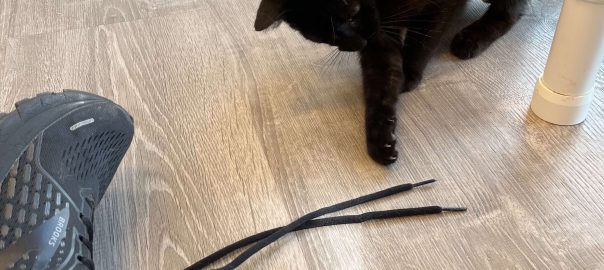While volunteering at a local animal shelter, my teen and I watched a kitten relate to my shoelace or a rolling plastic ball with a playfulness that had elements of hunting to it (the crouching approach, a pounce, batting it with a paw), but at no point did it ever try to eat these toys. Maybe it had tried at some prior point and learned that these items were not edible. We also realized that we have built up enough experiences with cats that we recognized this kitten’s movement as indicators that it felt safe and we were safe in its company.
I have written before about my interactions with people who have dementia and the varied ways there are intact connections of shared reality compared to situations where we are not as aligned. Two recent experiences raised my awareness of the role of movement and how it may be characterized.
One of the Friends I have known the longest has had a further decline in her hearing. Even using a personal amplifier, she does not register or understand what is spoken to her. Writing my part of our conversations on my phone with the Notes app remains a highly successful way for us to interact. Last week she had just woken up when I walked in, so was more disoriented than is typical. It was only as I was pulling my chair up to be near her head, as I always do, that she suddenly brightened: “I recognize you! You come and sit right there, and you hold my hand.” It was my movement that stirred her memory. It gave her a means of knowing me and the kinds of things we do together.
At the beginning of this week, I went to meet someone for the first time. I had been told she’d had a stroke which impacted her thinking and memory. She was seated somewhat slumped in a wheelchair in the community room with a very loud t.v. nearby. I knelt on one knee at the front of her chair in the hope that she would not have to strain to see or hear me and introduced myself with my badge. She responded, “What church do you go to?” I pointed to the spot on my badge that identifies the hospice group I volunteer with and said, “I’m actually not here from a church, I’m a volunteer.” Her spouse interjected with the name of their church, so I asked if she had a favorite scripture or hymn she would want to hear. Instead she said, “I am not interested in what you have to say. You can go now.”
Certainly anyone can decline to have a volunteer visit for any reason or no reason. I take no offense.
I only bring it up in reflection: I wonder if my movement in kneeling the way I did stirred her memory. Specifically, if what I did too closely resembled a stance she has remembered over her experiences as being unwelcome.
I’ve heard the expression “muscle memory” (that’s the means by which I am typing even now), but these experiences seemed more related to a memory of movement — even in persons who themselves are not moving much.
End blip.
